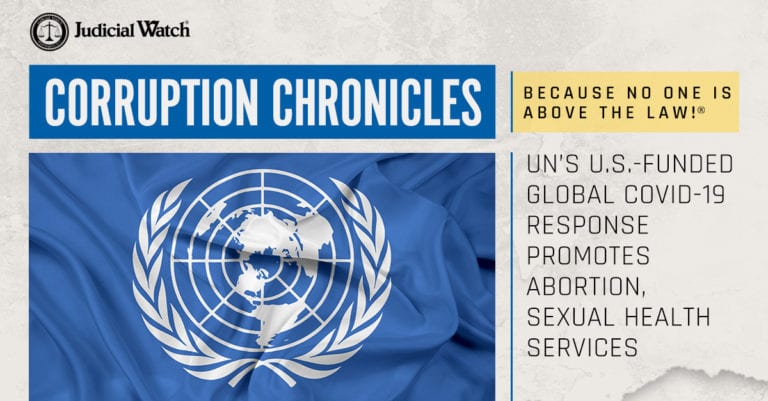

UN’s U.S.-Funded Global COVID-19 Response Promotes Abortion, Sexual Health Services


Always seizing opportunities to advance its leftist agenda, the United Nations (UN) is capitalizing on the coronavirus to promote sexual and reproductive health services—including abortion—by classifying them as “essential” healthcare in pandemic recovery efforts. Why should American taxpayers care? Because the United States is funding the endeavor and, in fact, is the largest donor of the UN program conducting the multi-billion-dollar initiative called COVID-19 Global Humanitarian Response Plan (HRP). In a tedious 80-page document, the world body offers details of its costly project to counter the public health and humanitarian consequences of the crisis. It includes categorizing sexual and reproductive health services on the same level of importance as malnutrition, sanitation, shelter, essential healthcare and food insecurity.
Since a large chunk of the American tax dollars flow into UN coffers via the U.S. Agency for International Development (USAID), the head of the agency fired off a letter to the UN Secretary General blasting the COVID-19 response plan for advancing access to abortion as an “essential service.” Besides donating a whopping $3.5 billion to UN health and humanitarian assistance in 2019, USAID has so far been the largest contributor to the global COVID-19 response by pledging more than $1 billion to the cause. In the letter USAID Administrator John Barsa directs UN Secretary General António Guterres to stay focused on life-saving interventions such as the delivery of essential health care and food to address shortages that could represent a second, deadly impact of the pandemic in many countries.
“The UN should not use this crisis as an opportunity to advance access to abortion as an essential service,” Barsa writes. “Unfortunately, the Global HRP does just this, by cynically placing the provision of sexual and reproductive health services on the same level of importance as food-insecurity, essential health care, malnutrition, shelter, and sanitation.” Barsa continues by writing: “Most egregious is that the Global HRP calls for the widespread distribution of abortion-inducing drugs and abortion supplies, and for the promotion of abortion in local country settings.” The Trump administration’s USAID administrator proceeds to ask the UN chief to remove references to sexual and reproductive health and its derivatives from the Global HRP and “drop the provision of abortion as an essential component of the UN’s priorities to respond to the COVID-19 pandemic.”
A Cuban American who grew up in south Florida, Barsa continues by noting that “under the leadership of President Donald J. Trump, the United States has made clear that we will never tire of defending innocent life.” The USAID chief reminds that during President Trump’s address to the 74the UN General Assembly, the commander-in-chief warned the UN that it has no business attacking the sovereignty of nations that wish to protect innocent life. “Indeed, the UN should not intimidate or coerce Member States that are committed to the right to life,” Barsa writes. “To use the COVID-19 pandemic as a justification to pressure governments to change their laws is an affront to the autonomy of each society to determine its own national policies on health care. The United States stands with nations that have pledged to protect the unborn.” Barsa also reveals that UN member countries are deeply divided over the use of the term “sexual and reproductive health” and its derivatives. “It is among the most polarizing issues raised in UN negotiations,” Barsa cautions, adding that “now is not the time to add unnecessary discord to the COVID-19 response.”
In the HRP’s introduction, Guterres makes it clear that the UN is hitting up member nations, especially the U.S., for more money, by calling on all donors and partners to maintain core support for the most vulnerable. “To divert funding from humanitarian needs at this time would create an environment in which cholera, measles and meningitis would thrive, even more children would become malnourished, and the narratives of violent extremists would take deeper hold,” Guterres writes. “It would also extend the breeding ground for the coronavirus disease itself.”















